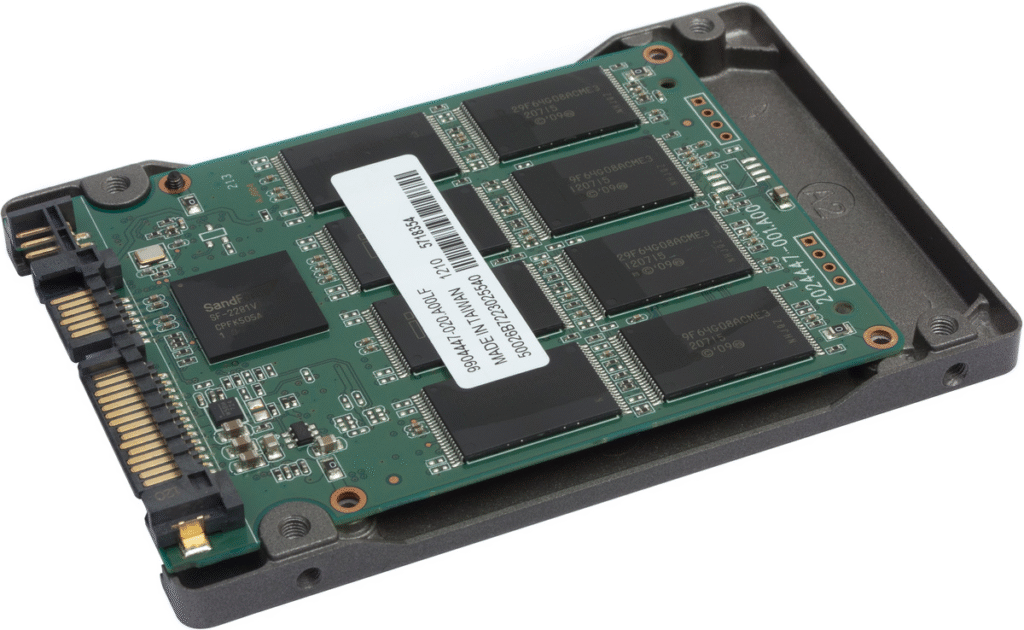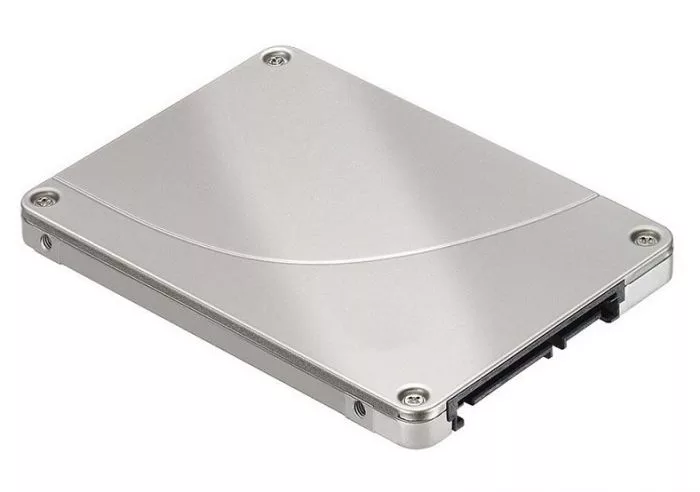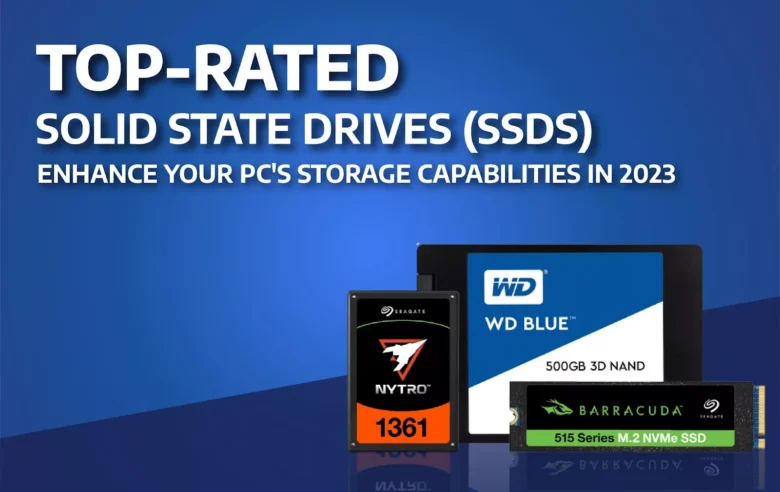If you desire to boost your computer’s performance, solid-state drives are the optimal choice. By utilizing SSDs to store data, your computer’s speed will improve, and you can run the most resource-intensive applications whenever you want. Solid-state drives are available in both internal and external storage options, featuring various designs and specifications.
It is important to note that not all SSD brands can meet your computer’s requirements, which is why it is crucial to conduct extensive research to comprehend their specifications and abilities. It is necessary to be precise about your needs when selecting an SSD for your PC or laptop.
This blog provides a detailed exploration of SSDs, their operation, and the most suitable options to install for enhancing your PC’s speed, efficiency, and overall performance. So, get your notebook ready and obtain valuable knowledge from us!
Using Solid-State Drives (SSDs) – The most convenient method to store your valuable data
Solid-State Drives (SSDs) are a modern type of storage device that has been developed to replace traditional spinning hard disk drives (HDDs). SSDs store data using flash memory on integrated circuits, and they are designed to surpass conventional hard disks, providing a superior level of performance. The primary characteristic that distinguishes SSDs from HDDs is their lack of moving components, which enhances their durability and reliability. Due to their compact design and exceptional performance, SSDs currently dominate the IT hardware market.

Important SSD Specifications to Keep in Mind
Although both SSDs and HDDs provide storage, many people mistakenly believe that they are identical. In reality, the two storage devices differ significantly in terms of design, specifications, and functionalities. SSDs are typically 2.5 inches in size and fit into a computer’s SATA connector. When purchasing an SSD, it is important to consider factors such as storage capacity, overclocking time, performance, speed, and other crucial features.
As the technology industry moves towards solid-state drives, IT hardware manufacturers are developing faster and more efficient storage devices. There are various types of SSDs, such as NVMe and mSATA, which are utilized to enhance the speed of Windows or Mac systems.
Let’s delve deeper into the operational mechanisms of these storage devices!
Understanding the Basic Principles of Solid-State Drive (SSD) Operations

It is essential to comprehend the working of SSDs. SSDs store data using an integrated circuit consisting of non-volatile memory semiconductor chips, meaning that data persists even when the system is turned off.
Below are some principles governing SSDs’ operations:
- Solid-state drives’ files cannot be overwritten without first being deleted, and the free space is reserved for later use. The TRIM command is used to reclaim this space. Once the pages are erased, the SSD collects all the data and removes it in one block.
- Overprovisioning, which provides ample storage on SSDs, is intended only for internal tasks and cannot be used for personal tasks. As a result, SSDs manage storage, internal functionalities, and background processes, making them superior to conventional hard disk drives.
- Block remapping occurs at the 70% mark when there is nothing left to erase or delete. Wear leveling is the third step that distributes the data-erasing cycles equally among all blocks, extending the lifespan of an SSD.
The essential component of modern computers for superior performance and reliability

SSDs have revolutionized computer storage, offering numerous advantages over traditional hard disk drives (HDDs). In addition to providing ample storage capacity, upgrading to an SSD can significantly enhance a computer’s performance, making it faster and more efficient, even when running resource-intensive programs. The benefits of SSDs are manifold:
- SSDs are more robust and durable than HDDs due to their solid-state designs that lack moving parts, reducing heat generation, and wear and tear, and making them less susceptible to physical shocks and drops.
- SSDs are lightning fast, with faster boot-up times and data transfer rates than HDDs, making them ideal for running applications that require quick data access, such as operating systems.
- SSDs are energy-efficient, consuming less power than HDDs, making them a preferable option for consumers who prioritize longer battery life for their devices.
- SSDs are compact and lightweight, making them ideal for use in portable devices such as laptops and tablets. Furthermore, they operate silently, with no vibrations or noise, unlike HDDs.
In conclusion, SSDs are an essential component of modern computers due to their superior performance, reliability, and efficiency, making them a preferred option over HDDs.
A Few Key Points to Remember
Assessing the reliability of an SSD involves taking into account various factors, including P/E cycles, TBW, and MTBF. These parameters can help determine whether a specific drive is appropriate for your requirements and give an idea of its expected lifespan.
- The number of times data is written to a solid-state NAND flash memory cell in an SSD, it undergoes a program-erase cycle before being wiped and rewritten. The amount of P/E cycles that an SSD can tolerate is determined by the technology used and can vary from 500 to 100,000 cycles.
- TBW, which stands for terabytes written, denotes the maximum data volume that an SSD can accommodate before it is prone to malfunction. As an illustration, the 860 EVO SSD offers distinct TBW warranty levels depending on the model, ranging from 150 TBW for a 250 GB version to 2,400 TBW for a 4 TB version. Typically, these drives come with a warranty period of five years or the TBW warranty, whichever ends first.
- To assess the dependability of a hardware item, MTBF (mean time between failures) is a crucial metric. It gauges the average number of hours between failures over the expected lifespan of the component. Typically, the MTBF for most parts ranges from hundreds to tens of thousands of hours. However, an SSD can last up to 1.5 million hours, which is significantly longer than the average lifespan of a hard drive, which is around 300,000 hours.
Top-rated Solid State Drives (SSDs)
As 2023 commences, it is expected that many businesses and organizations will make changes to their operational strategies and introduce new initiatives. To effectively handle the increase in data and also preserve old data, companies will require advanced storage devices. The best SSDs for maximizing a computer system’s storage capacity in 2023 are:
0NF76W – Dell 1.6TB SAS 12Gb/s Mix Use Hot-Pluggable 2.5-inch Solid State Drive

When Dell released its solid-state drives, it had a significant impact and quickly became one of the leading producers in the world. The 0NF76W is a prime example of Dell’s capabilities, as it is a 2.5-inch short-form factor SSD that can store up to 1.6 TB of data, making it an ideal choice for individuals who are concerned about storage. With features like self-encryption and SAS 12Gb/s, the 0NF76W outperforms SATA SSDs. Additionally, the multi-level cell design allows for data storage, and it can be plugged into a computer without the need for shutting it down, which has made it a popular choice among users. For those in search of a high-capacity SSD that offers easy computer connectivity and exceptional performance, the Dell 0NF76W is an excellent option.
SSDSC2BB800G7R – Intel 800GB MLC SATA 6Gb/s 2.5-inch Enterprise CLASS DC S3520 RI Series Solid State Drive

Intel is a major player in the IT hardware industry and has made a name for itself in the storage device market with the launch of the SSDSC2BB800G7R. This device offers a storage capacity of 800 GB, making it a reliable option for securing files and media. It comes equipped with the latest SATA 3 interface, which offers a bandwidth throughput of up to 600 MB/s and a data transfer rate of 6 Gb/s, making it one of the top-performing SSDs available. The Intel SSDSC2BB800G7R is specifically designed for speed, with a random read speed of 500 MB/s and a write speed of 460 MB/s, resulting in an input/output operation per second of 68000/20000. Due to its low power consumption and affordability compared to other SSDs in the market, it is a great option for data centers.
K2P90B – HP 920GB Multi-Level Cell (MLC) SAS 12Gb/s (FIPS) 2.5-inch Solid State Drive for 3PAR StoreServ 8000

The HP K2P90B is the optimal option if you’re seeking a solid-state drive that is both high-performing and durable. Its storage capacity of 920 GB guarantees that you won’t lose any of your important data or files. The K2P90B has a modern SAS interface, making it an ideal SSD for current data storage demands. When installed in your computer system, this SSD can enhance its performance. Purchasing the HP K2P90B SSD is a wise decision if you require a long-lasting storage device.
SSDSC1BG400G401 – Intel DC S3610 Series 400GB SATA 6GB/s 1.8-inch MLC Solid State Drive

For a storage device to be regarded as the best, it must possess qualities such as durability, ample storage capacity, and a fast data transfer rate. The Intel SSDSC1BG400G401 satisfies all of these requirements, making it the top pick. This storage device is capable of processing intricate data while boasting a substantial storage capacity, making it an excellent choice for enhancing your computer’s overall performance. With 200 GB of storage capacity, the Intel SSDSC1BG400G401 is ideal for small to medium-sized offices that require multi-level cells to store data. It employs a SATA interface that offers fast read and write speeds of up to 540 MB/s and 520 MB/s, respectively. If you require a storage device that can securely store your data for a prolonged period, the Intel SSDSC1BG400G401 is definitely worth considering.
VK0480GDJXV – HP 480GB SATA 6GB/s 2.5-inch SFF MLC Internal Solid State Drive

The HP VK0480GDJXV is a solid-state drive from HP that makes an appearance on this list. HP is renowned for its innovative and advanced products, and the VK0480GDJXV SSD is no exception. It offers a storage capacity of 480 GB, making it one of the most sought-after SSDs due to its excellent capacity to cost ratio. HP’s products consistently surpass expectations, and this SSD is no exception, boasting impressive read and write speeds and input/output operations per second. The VK0480GDJXV SSD is suitable for small and medium-sized enterprise office computers with limited data storage requirements. It uses a SATA 3 interface and has a data transfer speed of 6 Gb/s, providing the expected speed for a storage device. While this SSD performs remarkably well in office computers, its performance doubles when used for non-commercial data storage needs.
SSDPEKKF256G8L – Intel Pro 7600P 256GB M.2 PCI Express 3.1 x4 NVMe 3D2 TLC Solid State Drive

Another noteworthy solid-state drive on this list is the Intel SSDPEKKF256G8L, which is ideal for small offices and homes with a storage capacity of 256 GB. This SSD utilizes the latest M.2 flash technology and is designed to adapt to changing data requirements. Once installed, users can expect improved computer performance. The SSD is highly durable, ensuring the security and longevity of stored data. Its data transfer speed is impressively fast, enabling seamless data access and processing. If you desire the exceptional quality of Intel products, consider purchasing the Intel SSDPEKKF256G8L promptly.
MZ-7PD512BW – Samsung 840 Pro Series 512GB 2.5-inch Multi-Level-Cell Solid State Drive SATA Hard Drive

The Samsung 840 Pro series is widely regarded as one of the best-performing SSD series available in the market. With a storage capacity of 512 GB, this internal storage device is capable of efficiently handling medium to heavy data loads. The Samsung MZ-7PD512BW internal storage device is suitable for both personal and business use. Since it lacks any moving components, it consumes less energy than a traditional hard disk and can quickly retrieve and store data from your computer or server. The Samsung SSD 840 PRO Series delivers fast sequential read and write speeds of up to 540 MB/s, as well as random speeds of up to 100K IOPS, ensuring high-end performance for fast file transfers.
SSDSC2KB019T8 – Intel D3-S4510 Series 1.92TB Triple-Level-Cell SATA 6Gb/s 2.5-inch Solid State Drive

Intel continues to dominate the storage device market, and its products are prominently featured on this list. The Intel D3-S4510 Series SSDSC2KB019T8 is a high-performance NVMe SSD capable of handling almost any task. It delivers impressive sequential performance, with speeds of up to 6 GBps, and a guaranteed endurance of up to 1.92 TB, as well as achieving over 1.5 million random read/write IOPS. While it may be pricier than other alternatives, its outstanding performance and durability make it a worthwhile investment.
MZ-76P256BW – Samsung 860 PRO Series 256GB SATA 6Gb/s 512MB Cache 2.5-inch Solid State Drive

The Samsung MZ-76P256BW solid-state drive is a great option for storing your data. This internal SSD made by Samsung allows for easy access to your files and provides long-term security for your data. It’s particularly useful for storing and processing large files like 4K videos and 3D data, with read and write speeds of up to 530 MB/s and 560 MB/s, respectively. Its 2.5-inch form factor also makes it compatible with a wide range of notebooks and desktop PCs that support the SATA III interface. The PRO 860’s ECC algorithm and JMX controller ensure fast data transfer rates. Keep track of your drive’s performance and make new upgrades using Samsung’s Smart Magician tool.
SSDSC2BX480G4 – Intel SSD DC S3610 Series 480GB SATA 6.0Gb/s 2.5-inch MLC Solid State Drive

The SSDSC2BX480G4 from Intel is the last solid-state drive on the list, and it is considered to be one of the best-performing SSDs made by Intel. It provides 480 GB of storage space and is designed to work with most laptops because of its form factor. This SSD is a versatile and powerful drive that can handle almost any task thrown at it. It boasts sequential performance rates of up to 6 Gbps, achieves random read/write IOPS of over 1.5 million, and has a guaranteed endurance of up to 1.92 TB, making it the most long-lasting and fastest NVMe SSD available. However, compared to NAND flash alternatives, it is more costly, consumes more power, and has a smaller storage capacity.
What would be the preferable choice between an internal and external SSD for my use case?
Consumers are often faced with the challenge of deciding whether to use an internal or external SSD, as both can enhance computer performance. Internal and external solid-state drives provide excellent functional benefits that can improve performance and expand storage capacity. However, the decision on which to use will depend on the computer’s specific configuration. Therefore, it is crucial to keep searching for the most appropriate SSD to upgrade a slow computer into a more efficient workstation.
Final Considerations
Solid-state drives are highly recommended if you want to improve your computer’s storage capacity and performance. By upgrading to SSDs, you can ensure faster data access, smoother multitasking, and more reliable storage management. However, it’s crucial to choose the right SSD for your specific computing requirements. This involves considering the form factor, which determines the physical dimensions and connectivity of the SSD, and the performance metrics, such as read and write speeds, durability, and capacity. We have conducted extensive research on the storage device market, analyzed the technical features of SSDs, and provided a curated list of the top SSDs available today. With this knowledge, you can make an informed decision and enjoy the benefits of enhanced computer performance. Good luck!

Leave a Reply